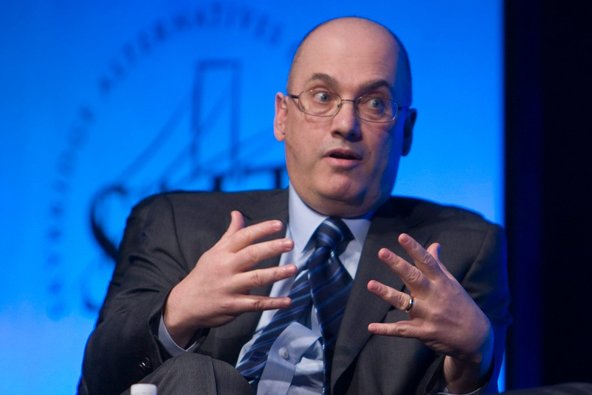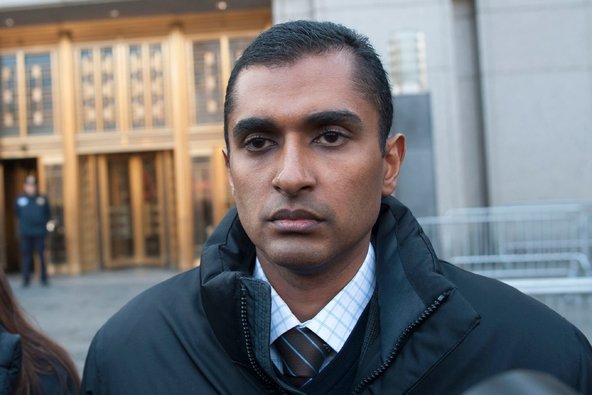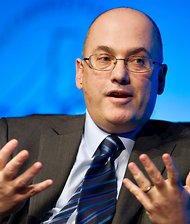 Steve Marcus/ReutersSteven A. Cohen, the owner of SAC Capital Advisors, is accused of failing to supervise former employees who face criminal charges.
Steve Marcus/ReutersSteven A. Cohen, the owner of SAC Capital Advisors, is accused of failing to supervise former employees who face criminal charges.
10:18 p.m. | Updated
After a long-running investigation into insider trading at the hedge fund SAC Capital Advisors, an inquiry that has produced several guilty pleas and a record $616 million civil penalty, the government on Friday brought a case for the first time against the fund’s billionaire owner, Steven A. Cohen.
In a civil action, the Securities and Exchange Commission accused Mr. Cohen of failing to supervise former employees who face criminal charges. The case, filed as an administrative proceeding at the agency rather than a lawsuit in federal court, contends that he ignored “red flags” that should have led him to investigate suspicious trading activity at SAC and take steps to prevent illegal conduct. If the S.E.C. prevails in its action against Mr. Cohen, there are a range of possible penalties, including assessing additional fines, barring Mr. Cohen from managing money for clients, or banning him from the financial services industry for life.
Although the case stops short of accusing Mr. Cohen of fraud or insider trading, it represents the first government action brought directly against him after an inquiry that has persisted for nearly a decade.
Related Links
 Documents: S.E.C.’s Civil Charges
Documents: S.E.C.’s Civil Charges Graphic: Insider Cases |
Graphic: Insider Cases |  Video
Video- Under New Chief, a Feistier S.E.C. Emerges
And while the government has taken its first direct shot at Mr. Cohen, it is unlikely to be the last. Federal prosecutors and the F.B.I. are continuing to build a criminal case against SAC, according to people briefed on the matter, who spoke on the condition of anonymity. The authorities expect to announce charges as soon as this summer, the people said, noting that prosecutors might indict other traders at SAC or the fund itself, a move that would effectively destroy the company.
Though a legal deadline to file some insider trading charges is approaching, authorities are planning to navigate around that requirement by filing a broader criminal conspiracy case against SAC, these people said. As long as one of the trades cited in the case took place in the last five years, then the government has leeway to include older trades to highlight a continuing scheme.
Mr. Cohen is not out of the woods, either. In May, federal authorities issued subpoenas to Mr. Cohen and five of his senior executives to testify before a grand jury. Mr. Cohen declined to testify, exercising his constitutional right against self-incrimination, the people briefed on the matter said.
Even if a criminal case never materializes, the S.E.C.’s action on Friday is a blow to Mr. Cohen, who has built SAC, which is based in Stamford, Conn., into one of the world’s largest and most powerful hedge funds, with about 1,000 employees and $15 billion in assets at the start of the year. It has a nearly unparalleled investment record, delivering nearly 30 percent annual returns, on average, over two decades. SAC’s investors, however, have already withdrawn billions of dollars from the fund this year as the government’s investigation has intensified.
 Keith Bedford/ReutersMathew Martoma, a former employee of SAC Capitol Advisors, has denied charges of insider trading and is set to go to trial Nov. 4.
Keith Bedford/ReutersMathew Martoma, a former employee of SAC Capitol Advisors, has denied charges of insider trading and is set to go to trial Nov. 4.
Mr. Cohen, 57, thought he put his legal troubles behind him in March when SAC agreed to pay a $616 million civil penalty to the S.E.C. The case resolved insider trading actions connected to the suspected misconduct of two former employees, Mathew Martoma and Michael S. Steinberg, though they did not directly implicate Mr. Cohen.
The S.E.C. filed its latest case, which accused Mr. Cohen of failing to supervise the two employees, a day before the five-year legal deadline to bring a case related to trades that Mr. Martoma made in July 2008.
“Hedge fund managers are responsible for exercising appropriate supervision over their employees to ensure that their firms comply with the securities laws,” Andrew J. Ceresney, co-director of enforcement at the S.E.C., said in a statement.
On Friday, Jonathan Gasthalter, an SAC spokesman, said the S.E.C.’s action had no merit. “Steve Cohen acted appropriately at all times and will fight this charge vigorously,” he said. “The S.E.C. ignores SAC’s exceptional supervisory structure, its extensive compliance policies and procedures, and Steve Cohen’s strong support for SAC’s compliance program.”
The firm’s compliance policies and procedures have come under fire as many former employees have found themselves under government scrutiny. Including Mr. Martoma and Mr. Steinberg, nine former SAC employees have been tied to insider trading while at the firm; four have pleaded guilty to criminal charges. Mr. Cohen has not been accused of any criminal wrongdoing.
Mr. Martoma, 39, and Mr. Steinberg, 40, have each pleaded not guilty to criminal insider trading charges and face separate trials in November. Lawyers for each declined to comment on the S.E.C. action against Mr. Cohen. Representatives for the United States attorney’s office for the Southern District of New York and the F.B.I. also declined to comment.
Despite the substantial investor withdrawals, Mr. Cohen has vowed to continue managing funds for outside clients, to whom he charges some of the highest fees in the hedge fund industry. Yet Mr. Cohen could return investors’ money and still run a sizable business that managed his own personal fortune. His wealth accounts for more than half of the fund’s $15 billion in assets.
The S.E.C.’s case against Mr. Cohen intensified this spring, people briefed on the case said, soon after the agency struck the settlement with the fund. The agency sent him a so-called Wells notice in late May, the people said, warning that the agency’s investigators would soon recommend charges.
Mr. Cohen’s lawyers pushed back in recent weeks, outlining a potential defense to the charges. But the agency decided to proceed, one person said, holding a special meeting with the agency’s five commissioners to consider the charges. The meeting was separate from the agency’s typical weekly gathering to discuss enforcement cases, a measure that allowed the agency to keep a tight lid on the case.
The case is not a slam-dunk. The S.E.C. must show not only that Mr. Martoma and Mr. Steinberg violated the law and that they operated under Mr. Cohen’s supervision, but also that Mr. Cohen failed to “reasonably” supervise them.
It could benefit the agency that the case will appear on its home turf. Instead of a being heard by a judge in federal court, the proceeding will take place before an S.E.C. administrative law judge, who will determine what penalties, if any, should be assessed against Mr. Cohen. The S.E.C. says that the illicit trading earned SAC profits and avoided losses totaling more than $275 million.
Friday’s filing provides additional details about two sets of trades made by SAC in 2008. The first involved Mr. Cohen’s collaboration with Mr. Martoma in accumulating large positions in the pharmaceutical companies Elan and Wyeth, which at the time were jointly developing an Alzheimer’s drug. In November, federal prosecutors charged Mr. Martoma with obtaining secret information from a doctor overseeing the drug’s clinical trials. That doctor, Sidney Gilman, has agreed to testify against Mr. Martoma.
Inside SAC, a number of other drug stock analysts at the fund objected to the large positions, but Mr. Cohen told them that he was following Mr. Martoma’s advice because he was “closer to it than you,” according to the court filing. The S.E.C. said that in a later instant message, Mr. Cohen said that it seemed as if Mr. Martoma “has a lot of good relationships in this area.”
Mr. Cohen also knew of a second doctor who might possibly have had secret information about the clinical trials, the S.E.C. said. Rather than express concern about the fund possessing potentially confidential information, Mr. Cohen encouraged Mr. Martoma to talk further with the doctor, according to the court filing.
On July 21, 2008, after building sizable holdings in Elan and Wyeth, SAC began aggressively selling shares in the two companies. The day before, on a Sunday, Mr. Martoma had a 20-minute phone call with Mr. Cohen. It is unclear what was said during that conversation, but Mr. Cohen, in a deposition that he gave to the S.E.C. last year, said that Mr. Martoma told him he had lost conviction in the positions.
The second trade at issue in the case involves shares of Dell. The S.E.C. also faults Mr. Cohen for not ferreting out what they suspect was illegal trading in shares of Dell in August 2008 by Mr. Steinberg and another former SAC employee, Jon Horvath, who pleaded guilty to criminal charges last year.
Friday’s court filing cites an e-mail about Dell that an SAC trader forwarded to Mr. Cohen, who was working at his summer home in the Hamptons. The e-mail was from Mr. Horvath, who worked under Mr. Steinberg, saying that he had a “2nd hand read from someone at the company” and went on to provide detailed information about Dell’s financial performance.
“Please keep this to yourself as obviously not well known,” Mr. Horvath wrote.
The S.E.C. says that based on this e-mail, Mr. Cohen should have taken prompt action to determine whether the fund was engaged in insider trading. Instead, according to the agency, Mr. Cohen quickly sold his small Dell position just before the company announced earnings.
Three hours after the earnings release, Mr. Cohen e-mailed Mr. Steinberg: “Nice job on Dell.”
Article source: http://dealbook.nytimes.com/2013/07/19/s-e-c-files-civil-case-against-steven-cohen-of-sac/?partner=rss&emc=rss







